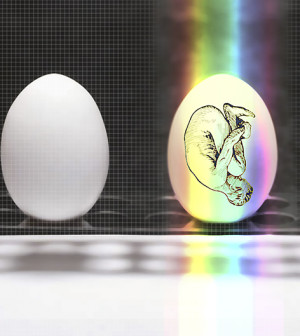- Double Mastectomy May Offer No Survival Benefit to Women With Breast Cancer
- Toxic Lead Found in Cinnamon Product, FDA Says
- Certain Abbott Blood Sugar Monitors May Give Incorrect Readings
- Athletes Can Expect High Ozone, Pollen Counts for Paris Olympics
- Fake Oxycontin Pills Widespread and Potentially Deadly: Report
- Shingles Vaccine Could Lower Dementia Risk
- Your Odds for Accidental Gun Death Rise Greatly in Certain States
- Kids From Poorer Families Less Likely to Survive Cancer
- Tough Workouts Won’t Trigger Cardiac Arrest in Folks With Long QT Syndrome
- At-Home Colon Cancer Test Can Save Lives
Exercising Moms-to-Be Have Less Chubby Newborns, Study Finds


Babies born to mothers who exercise in late pregnancy may enter the world with a little less body fat, a new study finds.
Researchers said that could be a good thing, since extra fat at birth could continue into childhood and beyond. But the long-term health implications, if any, are not known yet.
“Body composition at birth is important,” said Dr. Dana Dabelea, the senior researcher on the study and an associate professor at the University of Colorado School of Public Health.
“Two babies can be born at the same weight,” Dabelea said, “but have different amounts of fat mass and lean mass.”
Normally, a newborn’s tiny body is mainly composed of the internal organs, bones and lean tissue — with most of the “baby fat” coming later, Dabelea explained. So if exercise in late pregnancy does trim a bit of newborn fat, that could be a positive effect — as long as it doesn’t harm fetal growth and development, Dabelea said.
And that seemed to be true in this study, her team reports in the August issue of Obstetrics & Gynecology.
Looking at more than 800 mother-newborn pairs, the researchers found that when mothers exercised regularly in the third trimester, their babies were born with less fat, compared with newborns of less-active moms.
“But we didn’t see any effect on lean mass,” Dabelea said.
Experts already recommend that pregnant women get moderate exercise — for their sake and their baby’s. The American College of Obstetricians and Gynecologists says healthy pregnant women should aim for 30 minutes of moderate activity, such as brisk walking, most days of the week.
That’s partly because exercise can reduce the amount of blood sugar that gets to the fetus, which cuts the risk of having a larger-than-normal baby, said Dr. Joseph Fernandez, an obstetrician/gynecologist with Scott & White Healthcare in Round Rock, Texas.
“There used to be some hearsay that women who exercise a lot during pregnancy will have a small baby,” said Fernandez, who was not involved in the new study.
But he said these latest findings add to evidence that exercise benefits mothers-to-be and their babies.
The study included 826 Colorado women, average age 28, whose activity levels were tracked during pregnancy. Only 17 percent met the recommended guidelines on exercise. About 45 percent were overweight or obese.
In general, the researchers found, the one-quarter of women who were most active in late pregnancy tended to have less chubby babies than other mothers. Those active women were not running marathons — most got a modest amount of exercise on most days of the week, Dabelea said.
The researchers did find that the most-active mothers had an increased risk of having a “small-for-gestational-age” newborn — which means smaller than the norm for babies born during a given week of pregnancy.
But Dabelea attributed that to the lower level of body fat, rather than impaired growth and development in the womb.
Another ob/gyn who reviewed the study said the higher likelihood of small-for-gestational-age newborns is “a little concerning.” But there’s no way of knowing whether there could be negative effects in the long run.
“Is there a benefit from the lower fat mass? We don’t know yet. Is there a risk from being [small-for-gestational-age] when there is no effect on lean body mass? We don’t know,” said Dr. Jill Rabin, co-chief of ambulatory care and women’s health programs at North Shore-LIJ Health System, in New Hyde Park, N.Y.
Dabelea agreed that longer-term research is needed to see whether that lower fat mass at birth actually benefits children’s health.
But what is clear, the experts said, is that a generally healthy lifestyle is vital during pregnancy and before.
“It’s important to start optimizing your health before you become pregnant,” Rabin said. “Eat a healthy diet, get regular exercise, take prenatal vitamins, quit smoking.”
But even if a woman was sedentary before, it’s safe to start exercising during pregnancy, Fernandez said. Women can ask their doctors about the types of exercise that are appropriate, he said. In general, activities such as walking, swimming and cycling are suggested.
More information
The American College of Obstetricians and Gynecologists has advice on exercise during pregnancy.
Source: HealthDay
Copyright © 2024 HealthDay. All rights reserved.










